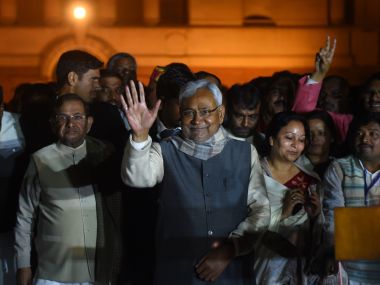In a pithy reaction to the first part of this article posted yesterday , a reader (The Unabashed Indian) almost chided me. He said the story of how Nitish Kumar breached his own fortress does not need a long thesis. “It can be said in a single sentence,” he said and quoted ‘ego’ as one of the three weapons of self-destruction. Nitish Kumar did indeed overplay his hand. He stretched his sudden, written-in-a-hurry, I-hate-Modi script to lengths at precisely the time that Modi mania was viralling across the country. And it backfired. Now that The Unabashed Indian has broken the rather thin suspense on ‘how’ Nitish did it, let me talk about ‘why’ he did it. When Nitish took his opposition to Modi to an obsessive level he calculated that a section of the BJP, inimical to Modi’s growing influence, would support him in his new political venture. While so miscalculating, he also overlooked the vulnerability of his Bihar model of development that was essentially funded by the state. [caption id=“attachment_2428918” align=“alignleft” width=“380”]  Bihar CM Nitish Kumar. AFP[/caption] He did not get the backing from Modi-baiters in the BJP and in his second stint as the chief minister, on the back of a thumping electoral victory, he was already seen to be faltering on the development front as well. Mostly because by now people were looking for development plus. So, was Nitish Kumar gullible in expecting support from Modi-baiters in the BJP? Till 2012, he was given to believe by leaders like LK Advani, Murli Manohar Joshi, Sushma Swaraj and Nitin Gadkari that there was hardly any scope for Modi to burst on the national stage. In a dinner meeting hosted by Arun Jaitley, the then BJP president Nitin Gadkari famously remarked, “Nitish ji agar aap chahenge tab bhi vo pradhan mantra nahi ban sakte (Nitishji even if you want Modi will never become the Prime Minister)”. Nitish Kumar calculated that internal BJP bickering would exacerbate if Modi were to be declared as their prime ministerial candidate. For a time back then it did seem like Nitish Kumar was not far off the mark. In Nitish Kumar’s assessment, the BJP had a limited capacity to grow and would be restricted way below the majority mark in the best case scenario. His assumptions were based on his deep socialist belief that political mobilization of the castes would limit the BJP’s growth. He was way off the mark. For all his anti-Modi fulminations, Muslims chose Lalu and his support base, the upper castes, totally deserted him. This drubbing disoriented Nitish and his politics. One blunder followed another. He resigned as the chief minister and chose a Jitan Ram Manjhi, a Mahadalit, as his successor. Manjhi, is known for shifting his allegiance according to convenience. While Nitish seemed to be an introspection mode, Manjhi’s liaison with the BJP was an open secret. Given Manjhi’s long experience as minister in different governments in Bihar, he initiated measures to consolidate his Mahadalit support base that essentially formed the core constituency of Nitish Kumar’s coalition of extremes. Having been deserted by upper castes and Mahadalits, Kumar found himself in a precarious position and compounded his blunders by choosing an alliance with Lalu’s RJD in desperation. This flew in the face of his own politics of the last two decades and the massive affirmative mandate he received in 2010 on the Lalu-Jungle-Raj plank. In essence Nitish Kumar’s alliance with Lalu was perceived to be a contradiction of what he stood for all these years. When he took over as the chief minister for fourth time after dislodging Manjhi, Kumar was presiding over a moth-eaten political legacy of his own. Though he tried to whip up support by returning his voters to the development narrative of his successful first term, his slogans had lost the ring of honesty of yore. Lalu’s caste rant (Mandal II, he screamed at the Mahagathbandhan rally) drags Bihar to the 90s and pushes Nitish to the margins of an election that should have been so his for the taking. Suddenly, the man who turned around Bihar has squandered the narrative of development and optimism he weaved. As an observer of politics you learn not to write pre-mature epitaphs of politicians. This is not meant to be one. This is just to point out that Nitish should have been in a commanding position, not on shaky ground.
When Nitish took his opposition to Modi to an obsessive level he calculated that a section of the BJP, inimical to Modi’s growing influence, would support him in his new political venture.
Advertisement
End of Article


)
)
)
)
)
)
)
)
)



